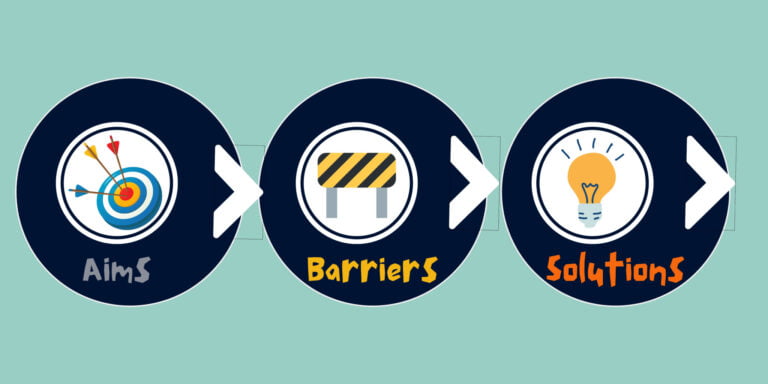 At Enact Solutions we know from our polling that up to two-thirds of managers have avoided a ‘difficult’ conversation at work. Although we understand that having ‘difficult’ conversations can be daunting, ensuring that you have a respectful rapport with colleagues can spark positive change company-wide.
At Enact Solutions we know from our polling that up to two-thirds of managers have avoided a ‘difficult’ conversation at work. Although we understand that having ‘difficult’ conversations can be daunting, ensuring that you have a respectful rapport with colleagues can spark positive change company-wide.
We’ve recently been hosting our exciting Livestream showcases that give companies an insight into the training programs we offer. Leaders from a range of sectors attended our ‘Productive Conversations’ showcase last month to get a glimpse of our new half-day immersive workshop.
We appreciate it can be intimidating to have difficult conversations, managers may be scared of facing backlash or hurting someone’s feelings. Our workshop uses actors (don’t worry, attendees don’t have to act), experiential learning and forum theatre to increase team leaders’ confidence to have these conversations. The workshop isn’t designed to finger-point or blame but instead, it provides a safe space for attendees to experiment and learn. There is no right or wrong answer, it’s all about trial and error.
Where’s the proof?
So, where’s the proof that colleagues find it difficult to have open and honest conversations with each other? Well, one of our longest-running training programmes in this area, undertaken for a major UK utility company since 2017, has polled hundreds of employees in senior team leadership roles. The data is highly compelling. Most notably, one in three participants classed themselves as ‘reluctant’ or even ‘avoidant’ when it comes to raising issues with colleagues. And as many as two-thirds of them admitted they had actually avoided an honest conversation with someone at work.
Communication between managers, team leaders and employees is very important. Lack of communication can lead to a toxic work culture and a variety of workplace issues including:
· Misunderstandings
· Decreased employee satisfaction
· Increased work conflicts
· Lack of productivity
· Wellbeing problems
· Reduced teamwork
· Low morale
· High employee turnover
· Undeveloped individual potential
· Poor service quality
In our recent ‘Productive Conversations’ showcase, our team of actors exemplified the impact that avoiding ‘productive conversations’ can have on colleagues and encouraged leaders to look in-depth into what might be getting in the way of them having these discussions.
The scene
Jordan (an assistant administrator) who has been working in a hospital for six months is scheduled to have her first chat with Charlie (senior administrator) about her progress and the current restructuring of the department. Charlie has rescheduled this meeting a handful
of times and consequently, Jordan is concerned about her development and her stability within the company.
When Charlie and Jordan sit down to have a conversation, Jordan takes out a notebook with things she’d like to address. Charlie is dismissive of this and instead rushes through the chat. Although Charlie does let Jordan know that she has made great development within the company, she doesn’t elaborate much on this and instead spends more time asking Jordan if she could start working an extra day to take on some of the responsibilities of a staff member who is going on maternity leave. Jordan expresses her concerns about taking on these responsibilities but unfortunately, Charlie glosses over them and seems to be expecting Jordan to say yes. Charlie appears unprepared, lacking in time management and dismissive of Jordan’s feelings throughout the conversation. This leaves Jordan confused, stressed and unsatisfied.
Discussion time!
After the scene, the delegates discussed the behaviours exemplified and considered prompts such as “How important is it that we know our colleagues and why?” and “What impact did Charlie’s behaviour and style have on Jordan?”. They identified unproductive behaviours displayed by Charlie such as consistently rescheduling the meeting, not preparing before the conversation, rushing the conversation, not listening to Jordan’s concerns, or providing her full attention, as well as presuming that Jordan would take on the extra workload she was asking of her. Participants also touched on the fact that Charlie was experiencing external pressure to get the job role filled quickly.
After identifying the cause and effect of the actors’ behaviours, attendees then got a taster of forum theatre. They worked together to suggest alternative ways in which Charlie could have acted/spoken towards Jordan to improve the efficiency of the conversation as well as meet Jordan and her needs. They explored ways in which Charlie could have approached the conversation, amongst them were:
· Increase her self-awareness and awareness of Jordan’s feelings
· Listen to Jordan’s concerns and make her feel heard
· Choose the right setting for the conversation
· Prepare the content of the conversation beforehand
· Brainstorm solutions together
· Have a goal for the conversation but be flexible
Taking action by educating yourself on how to have a difficult conversation at work will create a multitude of benefits and help to create a positive workplace culture – boost morale, reduce well-being issues, increase understanding and strengthen professional relationships.
If you’d like to find out more about what we offer at Enact Solutions, check out our Learning and Development page and keep your eyes peeled for our upcoming showcases via our socials and website.
Zara Huxley



